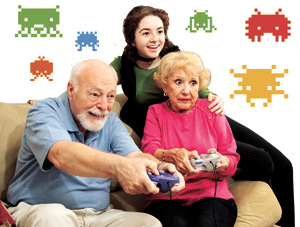If You Want Good Brain Health As You Age…Play Video Games!
 When you think of video games, you probably picture a teen with bloodshot eyes sitting in a dark basement furiously punching his fingers on a controller.
When you think of video games, you probably picture a teen with bloodshot eyes sitting in a dark basement furiously punching his fingers on a controller.
But older adults playing video games? Probably not.
However, research from at least three recent studies has shown that video games help improve cognitive function, balance and even well-being in older adults. Technology, it seems, is not just for the young but for people of all ages.
Retirement communities capitalized on the Wii craze a few years ago, using the interactive video game for exercise classes and recreational activities such as bowling. These games helped keep residents active, engaged their minds and provided much needed social interaction.
Studies show that movement, mind games and social activity are crucial in reversing the so-called “normal” signs of aging such as mental and physical decay.
Bari Lewis, the Director of Education and Advocacy for Kentucky, has monitored the research closely and is encouraged by the results but points out that success has come with older adults in good brain health.
“Video games keep healthy brains healthy,” she said. “The games wake up neural pathways and bring energy to the brain.”
The studies that caught her attention measured the impact brain training video games have on older adults.
The University of Chicago discovered that brain stimulating video games lead to better gait and balance.
After forming two groups of older adults, one played a digital game that increased in difficulty each time they played and challenged their ability to process information quickly.
The other group of adults had no change to their daily routine.
At the end of the study, researchers concluded that the games slowed the decline of people’s balance and walking speed.
Gaming developers partnered with neurologists at the University of California, San Francisco to develop a driving game called NeuroRacer, which measures the player’s ability to simultaneously drive a car and identify road signs.
The game works by strengthening cognitive skills and pushes players harder after each level is mastered.
After the study, researchers discovered that the game improved cognitive function in older adults. In addition, their brain activity began to resemble that of a young adult’s.
North Carolina State researchers took the same concept as UCSF but measured how gaming affected the player’s psyche rather than cognitive function.
The study performed at N.C. State revealed that those who played video games experienced greater happiness and lower indications of depression.
And those who did not tended to report more negative emotions and elevated signs of depression.
This research prompted Lewis, of the local Alzheimer’s association, to encourage new technology for her 77-year-old mother. When she bought one of the latest Apple models and requested a smart phone, Lewis was all for it.
“I think we should encourage our aging parents to pursue technology just like we would encourage other hobbies like traveling and learning a musical instrument,” Lewis said.
“Technology is an important part of the residential setting. These games can help engage our minds and this is critical to keeping good brain health.”

